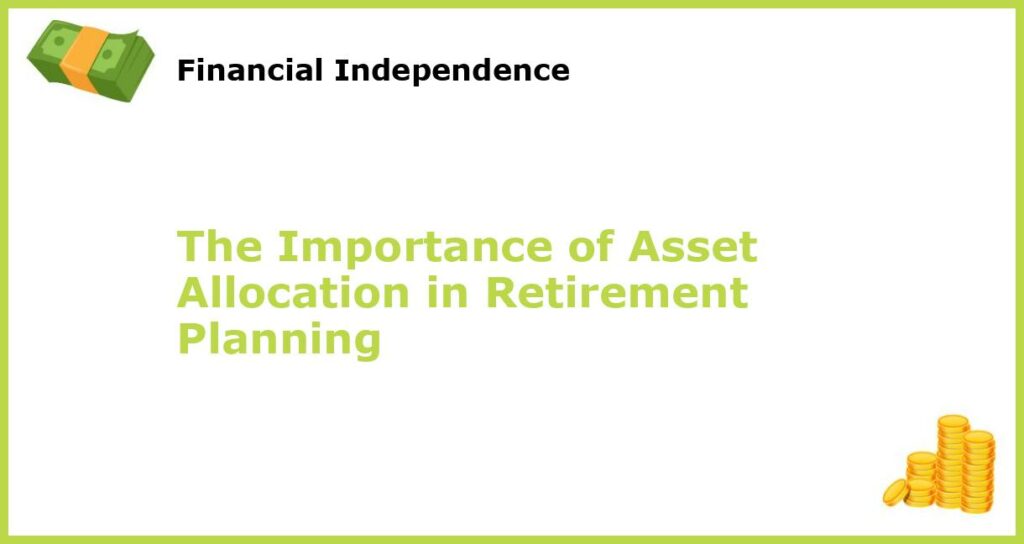Retirement planning is not an easy task, and it may take years of deliberation and sound decision making to live a comfortable life after retirement. Fortunately, investors can use certain strategies to manage investment risks and improve returns with ease. One important strategy for retirement planning is asset allocation, which involves dividing your investment portfolio amongst different assets like shares, stocks, and cash. Asset allocation has become an essential component of retirement planning because it enables investors to maximize returns while minimizing risks over the long-term.
Understanding Asset Allocation

Asset allocation is a critical part of retirement planning. In simple terms, it involves dividing your investment portfolio into different types, such as stocks, bonds, or cash, for diversification purposes. The primary advantage of asset allocation lies in the fact that it offers diversification benefits, which can help in managing risks, such as stock market volatility, and improve the portfolio’s long-term growth prospects. Therefore, it is important to understand the underlying mechanics of asset allocation, establish a clear target allocation, and track the portfolio’s performance against its benchmarks.
Managing Risk

In the world of investments, diversification is critical in managing risks. Asset allocation helps investors spread out their investments across different asset classes to mitigate the impact of an investment in a single asset going sour. This means that even if one investment performs poorly, the remaining investments in other assets can still preserve the portfolio’s value by cushioning against losses.
Besides, as investors approach retirement age, their portfolio must shift from high-risk assets such as stocks to low-risk assets to provide stability and predictability. With asset allocation, investors can manage risks effectively and achieve their long-term investment goals.
Increasing Return Potential

Asset allocation can be an effective way to achieve maximum return potential for an investor’s portfolio. This is because different assets have different risks and returns. By investing in a variety of assets, the investor can take advantage of the growth potential of each asset class while mitigating their overall risks in the portfolio. Historically, stocks have usually provided the highest returns of any asset class over the long term, but bonds and cash also have a place in a correctly diversified portfolio, as they usually provide stable cash-flow.
Assessing Risk Tolerance

Before investing in any kind of asset, it’s essential to consider one’s risk tolerance, which is the ability and willingness to take on risks that come with investing. Risk tolerance can vary from one individual to the other, and people can approach it differently based on their age, financial situation, and investment goals. Ideally, the more an investor is willing to take risks, the more aggressive their portfolio allocation should be. On the other hand, investors who are risk-averse should consider a conservative portfolio. Therefore, understanding your appetite for risk is crucial in setting your asset allocation strategy.
Adjusting Your Asset Allocation
Asset allocation calls for continual monitoring and evaluations over time. Investment goals, personal circumstances, and market changes can affect the allocation formula; hence an investor must adjust their asset allocation accordingly. One example of this is as investors approach retirement, they’d typically shift their asset allocation from stocks to bonds or cash to reduce market volatility to control risk better.
At the same time, a significant life event such as a divorce, marriage, or an inheritance could provide additional monetary resources, affecting the asset allocation of the portfolio. Therefore, it’s advisable for investors to regularly review their asset allocation to ensure that it aligns with their life goals.
Meeting Your Retirement Goals
The ultimate goal of asset allocation in retirement planning is to meet one’s retirement objectives. These objectives could include generating predictable income streams or creating a legacy for one’s family. Usually, these goals are long term in nature, and asset allocation helps investors reach their objectives by managing the risk, providing diversification, and maximizing returns over that period.
Working with a Financial Advisor
Navigating the world of investments can be daunting and confusing for the average person. Financial advisors simplify the process by providing valuable insights, knowledge, and a disciplined approach to investing. Working with a financial advisor can offer multiple advantages, including tailored asset allocation strategies suited to an individual’s goals and a more comprehensive understanding of the risks involved. Advisors can also handle the regular rebalancing of your portfolio and help manage your investments dynamically based on market changes.
Balancing Risk and Reward
Asset allocation is all about finding the perfect balance between risk and reward. While aggressive portfolios generate higher returns, they are also associated with higher risk levels. At the same time, conservative investments come with lower risk but could yield lower returns. By balancing the investment between these two segments, an investor can position themselves to not only maximize returns but also minimize risks.
Maintaining a Disciplined Approach
Investing is a long journey with its ups and downs, as markets are usually characterized by extreme volatility. Many investors make the mistake of reacting impulsively to short-term events and make regrettable investment decisions. By maintaining a disciplined approach to one’s asset allocation strategy rather than reacting to market fluctuations, investors are better positioned to achieve their long-term retirement goals.







